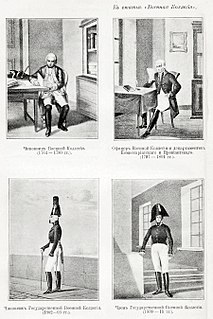
Peter II Alexeyevich reigned as Emperor of Russia from 1727 until his untimely death at the age of 14. He was the only son of Tsarevich Alexei Petrovich and of Charlotte Christine of Brunswick-Lüneburg. He was the last agnatic member of the House of Romanov.

The Governing Senate was a legislative, judicial, and executive body of the Russian Emperors, instituted by Peter the Great to replace the Boyar Duma and lasted until the very end of the Russian Empire. It was chaired by the Procurator General, who served as the link between the sovereign and the Senate; he acted, in the emperor's own words, as "the sovereign's eye".

The Governorate of Livonia was one of the Baltic governorates of the Russian Empire, now divided between Latvia and Estonia.

Saint Petersburg Governorate, or Government of Saint Petersburg, was an administrative division of the Tsardom of Russia, the Russian Empire, and the Russian SFSR, which existed during 1917–1927.

The State Duma or Imperial Duma was the Lower House, part of the legislative assembly in the late Russian Empire, which held its meetings in the Taurida Palace in St. Petersburg. It convened four times between 27 April 1906 and the collapse of the Empire in February 1917. The First and the Second Dumas were more democratic and represented a greater number of national types than their successors. The Third Duma was dominated by gentry, landowners and businessmen. The Fourth Duma held five sessions; it existed until 2 March 1917, and was formally dissolved on 6 October 1917.
The Procurator was an office initially established in 1722 by Peter the Great, the first Emperor of the Russian Empire, as part of reforms to bring the Russian Orthodox Church more directly under his control.

Ministry of War of the Russian Empire, was an administrative body in the Russian Empire from 1802 to 1917.

Arkhangelsk Governorate was an administrative division of the Russian Empire and Russian SFSR, which existed from 1796 until 1929. Its seat was in Arkhangelsk. The governorate was located in the north of the Russian Empire and bordered Tobolsk Governorate in the south-east, Vologda Governorate in the south, Olonets Governorate in the southwest, Sweden in the west, and Norway in north-west. In the north, the governorate was limited by the White and Barents Seas.

The College of War was a Russian executive body, created in the government reform of 1717. It was the only one of the six original and three later colleges to survive the decentralising reforms of Catherine II of Russia. Under Paul I, it became the model for a newly centralised government.
The Gold Sword for Bravery was a Russian award for bravery. It was set up with two grades on 27 July 1720 by Peter the Great, reclassified as a public order in 1807 and abolished in 1917. From 1913 to 1917 it was renamed the Saint George Sword and considered one of the grades of the Order of St. George.

Vitebsk Governorate was an administrative unit (guberniya) of the Russian Empire, with the seat of governorship in Vitebsk. It was established in 1802 by splitting the Byelorussia Governorate and existed until 1924. Today most of the area belongs to Belarus, the northwestern part to Latvia and the northeastern part to Pskov and Smolensk Oblasts of Russia.

The Governor of Sevastopol is head of the executive branch of the political system in the city of Sevastopol. The governor's office administers all city services, public property, police and fire protection, most public agencies, and enforces all city and state laws within Sevastopol.
The prosecutor general was one of the highest government positions in the Russian Empire, the head of the Governing Senate, who oversaw the legality of the activities of government agencies.

Prince Alexey Alekseevich Dolgorukov (1767–1834) was a Russian statesman, Actual Privy Councillor (1832), Simbirsk (1808–1815) and Moscow (1815–1817) Governor, Senator (1817), Prosecutor General (1827–1829), manager of the Ministry of Justice (1827–1829), member of the State Council.
This page is based on this
Wikipedia article Text is available under the
CC BY-SA 4.0 license; additional terms may apply.
Images, videos and audio are available under their respective licenses.










